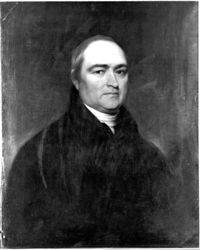Annotation:Murillo's Lesson: Difference between revisions
No edit summary |
No edit summary |
||
| Line 25: | Line 25: | ||
''There grateful to heaven with transport shall bring''<br> | ''There grateful to heaven with transport shall bring''<br> | ||
</blockquote> | </blockquote> | ||
The first strain is shared with "[[Colosseum (The)]]," "[[Harlequin Hornpipe (4)]]" and "[[Harlequin Gambols]]." Compare also with "[[Bonaparte Crossing the Rhine]]," which is a distanced version of this strain. | The first strain is shared with "[[Colosseum (The)]]," "[[Harlequin Hornpipe (4)]]" and "[[Harlequin Gambols]]." Compare also with "[[Bonaparte Crossing the Rhine (2)]]," which is a distanced version of this strain. | ||
</font></p> | </font></p> | ||
<p><font face="garamond, serif" size="4"> | <p><font face="garamond, serif" size="4"> | ||
Revision as of 05:22, 7 March 2014
Back to Murillo's Lesson
MURILLO'S LESSON. AKA - "Marilla's Lesson," "Morella's Lesson," "Morelli's Lesson." Old-Time, Hymn Tune and Air. USA, Alabama. C Major. Standard tuning (fiddle). AABB. The melody can be found in early 19th century instrument tutors, derived from a Sacred Harp (shape-note) hymnal, where the indicated tune was "Morelli," or "Lesson by Morelli." It was a favorite tune of Uncle William Johnson of Alabama's Johnson Family Band. It was also mentioned in newspaper articles about Tom Freeman of Cullman County, Alabama, and in his autobiography. It was adapted by fiddlers, particularly from Alabama and contiguous states, as an air or march. See also note for "Once Upon My Cheek."
The song called "Murillo's Lesson" can be found in the 1844 Sacred Harp and the 1848 Sacred Melodeon, 'fa-so-la' hymnals. Lyrics were derived in part from a poem entitled "Columbia" (AKA "Star of Columbia") by Timothy Dwight (1752-1817), printed in 1794. Dwight was one of the “Hartford Wits,” a group of Connecticut men associated with literary work during and after the American Revolution. He would go on to become president of Yale College, but was a young man when he wrote his lyric “Columbia” in 1778, when he was a chaplain in for George Washington’s Continental Army. The words to "Murillo's Lesson" go:

As down a lone valley with cedars o'erspread,
From war's dread confusion I pensively strayed,
The gloom from the face of fair heaven retired,
The winds hushed their murmurs, the thunders expired.
Perfumes as of Eden flowed sweetly along,
A voice as of angels enchantingly sung,
Columbia, Columbia to glory arise,
The queen of the world and the child of the skies.
Fair science her gate to thy sons shall unbar,
And the east see thy morn hide the beams of her star.
New bards and new sages unrivalled shall soar
To fame unextinguished when time is no more.
To Thee the last refuge of virtue designed,
Shall fly from all nations the best of mankind;
There grateful to heaven with transport shall bring
The first strain is shared with "Colosseum (The)," "Harlequin Hornpipe (4)" and "Harlequin Gambols." Compare also with "Bonaparte Crossing the Rhine (2)," which is a distanced version of this strain.
Source for notated version:
Printed sources: Howe (Complete Preceptor for the Accordeon), 1843; p. 12.
Recorded sources:
See also listing at:
Jane Keefer's Folk Music Index: An Index to Recorded Sources [1]
See/hear the shape-note version of the song on youtube.com [2]
See/hear Jim and Joyce Cauthen play the tune on youtube.com [3]
